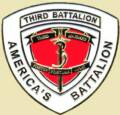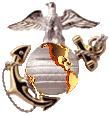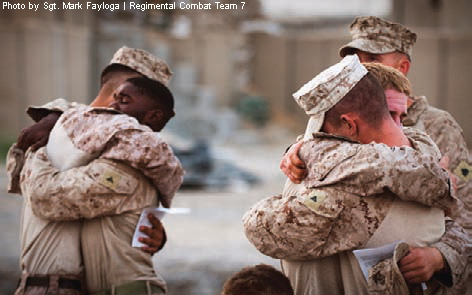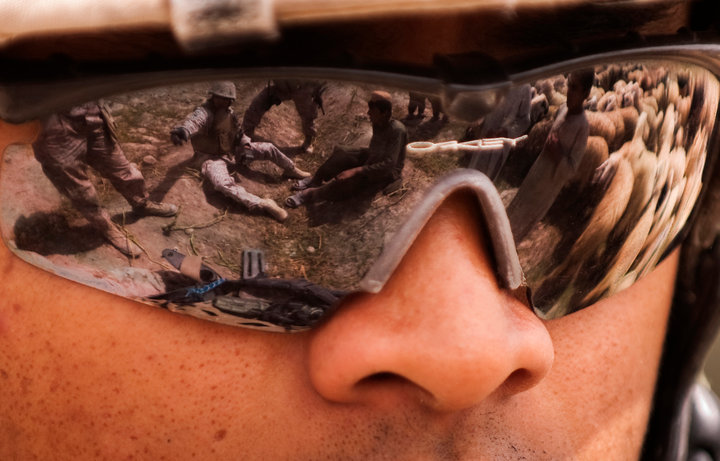Marines from Sgt. Joe L. Wrightsman’s squad embrace each other after paying tribute at the fallen Marine’s monument during a memorial service at Patrol Base Jaker, Afghanistan, July 30.
Marine gives life trying to save Afghan policeman
Sgt. Mark Fayloga
Regimental Combat Team 7
PATROL BASE JAKER, Afghanistan —
Cpl. Joe L. Wrightsman gave his life trying to save an Afghan policeman drowning in Afghanistan’s Helmand River July 18. And while the two would ultimately become victims of the powerful currents, Wrightsman’s actions weren’t in vain.
Wrightsman’s squad had a mission to conduct a zone reconnaissance patrol in an area rumored to be inhabited by enemy forces, and perhaps no one in the squad looked forward to the prospect of a fight more than the squad leader. Wrightsman was a quintessential infantryman, a combat veteran on his fourth deployment in as many years.
Since arriving in Afghanistan more than two months ago, Wrightsman took time out on occasion to talk with his Marines about the work they’d been doing. Third battalion, 3rd Marine Regiment may not have been seeing as much action as other battalions in the region but he wanted them to know they were doing a good job and making a difference. Today though, there was a chance of a firefight — every grunt’s dream. Wrightsman was excited and just like his work ethic and smile, the enthusiasm was contagious.
“That’s just how he was,” said Lance Cpl. Michael A. Barnhouse, a Kilo Company team leader who Wrightsman has mentored for more than two years. “The Marine Corps was his life.”
The squad was on a timeline, and when it looked like they might not make it to their first checkpoint in time, Wrightsman made a joke to ease the mood. He was always doing that, cracking jokes and talking trash. He liked for his Marines to be relaxed, but diligent. He knew when to play and when to work.
“He was like a dad to us,” Barnhouse said. “He’d take us under his wing and make sure we didn’t mess up. If we did he wouldn’t yell at us, but show us what we did wrong and how to correct it.”
The men arrived at the checkpoint in time, early actually. Wrightsman had taught his men how to make everything a small competition, at the very least to push themselves. When they were running behind, that mindset kicked in.
“He always wanted to finish first,” said another of Wrightsman’s Marines, Lance Cpl. Thomas C. Morton. “He always pushed us to beat the other squads in competitions, and it made us feel like we were something separate. We were kind of the golden children.”
The Marines pushed on to the Helmand River. Barnhouse’s fire team was point on the patrol, but Wrightsman moved up to cross the river first. He wanted to make sure it was safe. He was always looking out for his Marines. Even back in the battalion’s home station of Hawaii he would continually take the blame for mistakes made by the men in his squad and then handle their discipline.
“He would never let someone else get on us,” said Lance Cpl. Michael X. Shaw. “He always cared about us more than he seemed to care about himself.”
The squad knew Wrightsman wasn’t a strong swimmer. He told them. Like most things, he’d joke about it. But his squad might not have known how much the 23-year-old from Jonesboro, La., genuinely feared the water. While attending a squad leaders course back in Hawaii Wrightsman and his fellow students would go to the pool for physical training sessions, he always elected to get thrashed twice as hard on land rather than set foot in the water.
But Wrightsman would never let fear keep him from taking care of his squad. He traversed the river first. He made it across and the others followed. Barnhouse’s team took point again, but the Helmand river twists and winds. Before long the squad needed to cross again. Wrightsman took the lead once more. The current was stronger at this point in the river. The water level rose from ankle to waist-deep at the crossing point. Nevertheless, Wrightsman made it across, and the rest of the squad began crossing in pairs.
An interpreter and an Afghan policeman, Wahidullah Fida Mohamad, were the next two behind Wrightsman. The Marines often went on partnered patrols with the Afghan National Police, and they liked when Wahidullah came along. They called him the Watermelon King for his tendency to produce watermelons seemingly out of nowhere during breaks in the patrol.
Wahidullah and the interpreter made it halfway across the river when they were separated. The current was strong and the riverbed was made up of mud and rocks. Even the Marines, with their heavy combat loads weighing them down, sometimes had trouble keeping traction with the riverbed.
The Watermelon King was not a large man. He fought to walk against the current but just ended up getting pushed further down river. Wrightsman went back into the river to help Wahidullah to shore.
Another Marine crossing the river hit a drop-off and completely disappeared into the water, save for a lone hand rising above the surface. Marines helped pull him out and then all of the men began making their way back out of the river except for Wrightsman. He continued trudging through the water to help Wahidullah.
Wrightsman caught up to the drifting policeman and was pulling him out of the water when the two suddenly disappeared completely — swallowed by the Helmand River.
Barnhouse immediately removed his gear and headed for the water after watching his mentor vanish. After getting about 25 meters into the river Barnhouse saw Wrightsman’s head pop out of the water. He no longer had his helmet on as he yelled out, “I need help.”
It was the last time Barnhouse ever saw him.
He swam frantically toward where Wrightsman popped up and kept swimming down river after him. Barnhouse struggled in the river. His boots were weighing him down, and his uniform dragged and resisted the water as he tried to swim. He had trouble staying afloat and started making his way back to shore but couldn’t. He succumbed to the river.
“I don’t know how long I was under but I was able to get my head back up out of the water and I heard somebody yell, ‘there he is,’ but I was so disoriented I didn’t know if they were talking about me or Wrightsman,” he said.
Barnhouse tried to stay calm, the way Wrightsman had always taught him to. He knew he had to stay relaxed to get out of the river, but the water overtook him again.
“The second time I went under I pretty much made my peace,” the 22-year-old said. “I thought, ‘this is it. I guess this is what it feels like to be drowning,’ and then I got pulled out of the water.”
Face down in the dirt, fighting to put air back into his lungs, Barnhouse could hear Marines around him screaming, “Where’s Wrightsman? Has anybody seen Wrightsman?”
That evening, from exhaustion, or maybe heartache, Barnhouse’s body shutdown on him and he had to be medically evacuated. The search for Wrightsman continued while Barnhouse sat in a recovery room at Camp Dwyer more than 30 miles away.
He stared at the ceiling, replaying the events and telling himself it couldn’t really be happening.
When Wrightsman had popped up out the water and hollered, “I need help,” he didn’t sound fearful.
“I think what he meant was, ‘I need help getting this guy out of the water,’” Barnhouse said. “He wasn’t worried about himself.”
Barnhouse had a scene in his head. Marines would make their way up the river and there’d be Wrightsman, a cigarette hanging from his signature smile. As always, the charismatic Marine would make a joke and tease his Marines, “What took you guys so long?”
Barnhouse held onto the hope that they’d find Wrightsman alive. Morton and Shaw tried to stay optimistic as well, but after seeing Wrightsman when he popped up out of the water again further down the river they thought they’d already lost him.
Morton was one of the closest to Wrightsman and Wahidullah when they went under. He dropped his gear and went in after them, but like most in the river, he quickly exhausted himself fighting to swim in the current. He managed to make his way back to shore where he removed his boots in case he had to go in again and walked along the bank hoping to sight Wrightsman.
Before Wrightsman and Wahidullah had gone under, Shaw had been sucked under by the river as well, but was able to make his way back to shore quickly. Shaw, from Ashburn, Va., is a confident swimmer. He removed his gear and went in after Wrightsman. The 22-year-old likes to body board in his free time. The sport has taught him to work with the currents and how to handle himself in rough waters. He was able to navigate the river quickly and began gaining on Wrightsman.
Shaw and Morton worked together. Morton and Lance Cpl. Joshua S. Leventhal moved along the bank as scouts, searching for bubbles or any sign of Wrightsman so they could direct Shaw to him.
Wrightsman made his way back up out of the water one last time, about 70 yards from where he’d first come up and asked for help. Morton and Leventhal began yelling at him, trying to get his attention.
The noise registered with Wrightsman, but he only had about half of his face out of the water. He looked over at the Marines, let out a half-lunged groan and went back under.
Within seconds Shaw made it to where his squad leader went under.
“I dove down as far as I could,” Shaw said. “I felt the bottom of the river and couldn’t find him. I stayed underwater and kept swimming down river along the bottom. I’d come up and go back down. I kept diving and couldn’t find anything.”
Every asset available, Afghan and U.S., worked together to continue the search for Wrightsman and Wahidullah.
A recovery team found Wahidullah’s body the next day. A day later they found Wrightsman.
A memorial service for Wrightsman was held at Patrol Base Jaker July 30. He was remembered as a beloved leader and received a posthumous combat meritorious promotion to the rank of sergeant.
“He had a commitment to his brothers in arms that went beyond combat,” Capt. Shon S. Belcher, Kilo Company commander, said. “He believed in taking care of people, and that’s how he went out — sacrificing himself for someone in his squad.”
Wrightsman might not have saved Wahidullah that day, but the Afghan policeman wasn’t the only one who needed saving. Wrightsman’s Marines adored him — loved him in the purest form of brotherhood. When he went in the river after Wahidullah, his Marines did what they’d always felt compelled to do, follow his example. They couldn’t save him, but they saved one another in several instances.
They were there for each other because Wrightsman had always been there for them. Even with his fear of water, he had no hesitation in trying to save a man from a different country, a man in a different uniform, but a brother and a member of his squad all the same.
“His dedication will stay forever in the history of Afghanistan and will be remembered forever by the people of Nawa,” the Nawa District governor, Haji Abdul Manaf said during the memorial service.
The Helmand River may have claimed his body, but Sgt. Joe L. Wrightsman lives on in his Marines.
“You can definitely see an imprint of Wrightsman on our team leaders. All of them have been with him for years,” said Morton, from Nashville, Tenn. “They’re all their own men, but you can see Wrightsman in them.”
Marines, Afghan Army disrupt enemy supply routes during Operation Big Wave
Sgt. Mark Fayloga
Regimental Combat Team 7
KHANAGAWR, Helmand province, Islamic Republic of Afghanistan —
In an effort to disrupt enemy supply lines Marines and sailors from Headquarters Company, 3rd Battalion, 3rd Marine Regiment, partnered with the Afghan National Army to complete Operation Big Wave, a two-part operation in Khanagawr, on the eastern edge of the battalion’s tactical area of responsibility, and Southern Lashkar Gah, on the northern edge of their tactical area of responsibility, taking place from Aug. 15-20.
The operation was planned after the Marines received information that the enemy was bringing weapons, fighters and ammunition into Nawa from the north in preparation for the upcoming elections said Capt. Jason Armas, the Headquarters Company commander.
A platoon of Marines and Afghan soldiers worked together to complete the first part of Big Wave Aug. 15-19. Working out of Patrol Base Meinert, the partnered disruption effort conducted patrols and vehicle checkpoints south of Lashkar Gah. The operation took place during the Muslim holy month of Ramadan, when observers spend the days fasting. 1st Lt. Seth C. Miller, platoon commander, worked out a schedule so the soldiers could work without having to break their fast. During the nights the Afghan soldiers would work alongside the Marines, and during the daytime the Marines would continue the mission alone.
“We’d been with them during Ramadan so we knew what they were willing to do,” Miller, from Denver, said. “They surprised me sometimes by working all night and through the morning. Not having them there during the afternoon, it wasn’t a showstopper, but we couldn’t cover as many roads and it’s definitely better to have the ANA in the front when we’re dealing with locals.”
After 48 hours of the partnered disruption operations, more than 30 Marines and sailors were inserted by helicopter into Khanagawr to block off alternate transportation routes and to watch for any enemy fighters trying to cross the Helmand River. This portion of the operation was completed by coalition forces alone to prevent the Afghan soldiers from needing to break their fast. For two days the men stayed out in the barren desert, only getting a few hours sleep each night with no shelter from the day’s sun, where temperatures topped 120 degrees and where Armas admitted, “the heat was pretty brutal.”
In two days the Marines stopped more than 100 vehicles along their vehicle checkpoints, but neither part of the operation saw enemy contact.
The operation didn’t lead to any major cache finds, or detainees, but the men did gather useful information and see support from the local populace. Two farmers even helped the Marines in Khanagawr during a re-supply by hauling food and water in their tractors, saving the men from having to carry them a mile and a half in triple-digit heat.
“We threw the enemy something they haven’t seen before,” Armas said. “We definitely caused disruption over the last five days. I like to say that a reason there were zero significant actions over the last three days was because of the operation.




Phot1: Lance Cpl. Peter B. Choi, a team leader with HQ Co, 3/3, places weapons found during a vehicle checkpoint on the car’s hood, Aug. 19.
Phot2: Petty Officer 3rd Class Tyrel Greenough, a corpsman with Headquarters Company, 3rd Battalion, 3rd Marine Regiment, watches the helicopter that will take him and the men participating in Operation Big Wave back to base in Khanagawr, Afghanistan Aug. 20.

Phot3: Local farmers assisted the Marines by driving the supplies in their tractors, saving the men from having to carry them a mile and a half in triple-digit heat. Marines from Headquarters Company, 3rd Battalion, 3rd Marine Regiment, conduct a resupply during Operation Big Wave in Khanagawr, Afghanistan, Aug. 18. The operation was conducted to disrupt the enemy from using supply lines to bring weapons and fighters into Nawa.



PINJADOO, Helmand province, Afghanistan - Cpl. Anthony Patris, a vehicle commander from Jump Platoon, Headquarters Company, 3rd Battalion, 3rd Marine Regiment, listens in as his interpreter, Nasrullah Sadat, speaks with Afghan boys after an improvised explosive device detonated in Pinjadoo, Afghanistan, Sep 6, 2010. No Marines or Afghans were injured by the explosion. Jump Platoon investigated the area around the blast for secondary IED's and to gather information. (Official Marine Corps photo by Sgt. Mark Fayloga)